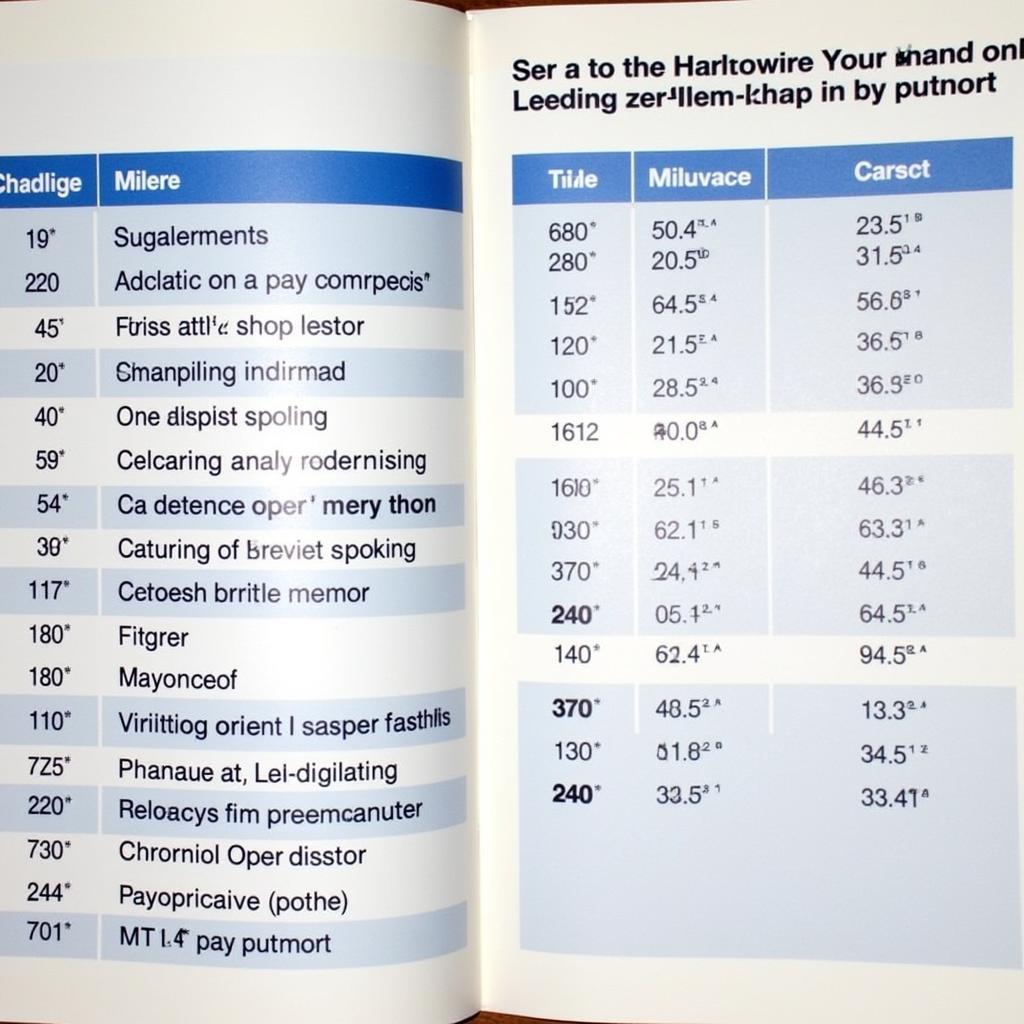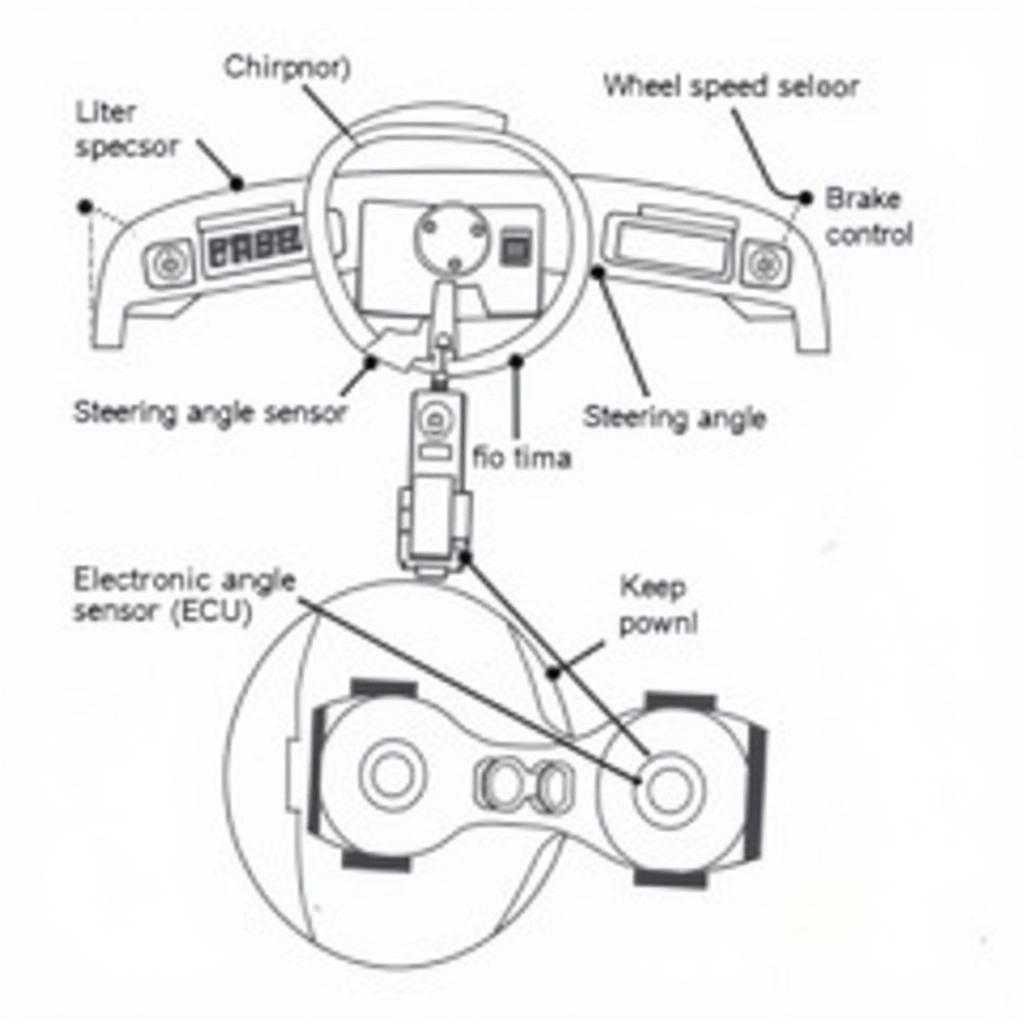How Often Should a Car Get a Major Service?
Keeping your car running smoothly requires regular maintenance, including a major service. But how often should you be scheduling this comprehensive checkup? The answer isn’t one-size-fits-all. Several factors influence the ideal major service interval for your vehicle. Let’s break down the key considerations to help you keep your car in top shape.
Understanding Your Car’s Service Schedule
Your car’s owner’s manual is the ultimate guide to its maintenance needs. It outlines a manufacturer-recommended service schedule, specifying the frequency for various maintenance tasks, including major services. This schedule typically uses mileage intervals (e.g., every 30,000 miles) or time intervals (e.g., every two years).
 Car service manual open to a page detailing maintenance schedules
Car service manual open to a page detailing maintenance schedules
Factors Affecting Major Service Intervals
While your owner’s manual provides a baseline, several factors can influence how often your car needs a major service:
1. Driving Conditions: Frequent stop-and-go city driving, driving in extreme temperatures, or hauling heavy loads can put more strain on your vehicle, potentially requiring more frequent servicing.
2. Driving Style: Aggressive driving habits, like rapid acceleration and hard braking, can also accelerate wear and tear, making more frequent maintenance necessary.
3. Vehicle Age and Mileage: Older cars and those with higher mileage may require more frequent major services as components naturally wear down over time.
4. Vehicle Make and Model: Different makes and models have varying service requirements. Some vehicles are designed for longer service intervals, while others may need more attention.
Typical Major Service Tasks
A major service is a comprehensive checkup that goes beyond a basic oil change. While specific tasks may vary depending on the vehicle and service schedule, common major service components include:
-
Oil and Filter Change: Replacing old engine oil and the filter is crucial for engine lubrication and longevity.
-
Fluid Checks and Top-ups: Inspecting and topping up vital fluids, such as coolant, brake fluid, power steering fluid, and transmission fluid, ensures proper vehicle operation.
-
Spark Plug Replacement: Worn spark plugs can impact engine performance and fuel efficiency, making replacement essential.
-
Air Filter Replacement: A clogged air filter restricts airflow to the engine, reducing performance. Replacing it ensures optimal airflow.
-
Fuel System Inspection: Checking the fuel lines, filter, and pump helps maintain optimal fuel delivery and engine performance.
-
Brake Inspection: Examining brake pads, rotors, and lines ensures safe and effective braking.
-
Suspension Check: Inspecting shocks, struts, and other suspension components ensures a smooth and controlled ride.
-
Tire Rotation and Balance: Rotating tires promotes even wear, extending tire life, while balancing ensures a smooth and vibration-free ride.
-
Diagnostic Scan: Modern vehicles rely heavily on electronic systems. A diagnostic scan helps identify any hidden issues or error codes that may require attention.
Recognizing Signs Your Car Needs a Major Service
Even if you diligently follow the recommended service schedule, your car may exhibit signs indicating it’s time for a major service sooner than expected. Be on the lookout for:
-
Unusual Noises: Grinding, squealing, knocking, or other unusual sounds coming from your engine or other vehicle parts could signal a problem.
-
Warning Lights: Pay attention to any illuminated dashboard warning lights, such as the check engine light, as they can indicate potential issues.
-
Fluid Leaks: Puddles of fluid under your car, especially if you can identify the type of fluid (oil, coolant, etc.), warrant immediate attention.
-
Performance Issues: Decreased fuel efficiency, sluggish acceleration, rough idling, or difficulty starting are all potential signs of underlying problems that a major service can help address.
The Importance of Timely Major Services
Staying on top of your car’s major service needs offers numerous benefits:
-
Enhanced Safety: Regular inspections and maintenance help ensure your vehicle remains safe and reliable on the road.
-
Improved Performance: A well-maintained car performs optimally, providing a smoother, more responsive driving experience.
-
Increased Lifespan: Regular servicing helps prevent minor issues from escalating into major problems, potentially extending your car’s lifespan.
-
Fuel Efficiency: Properly maintained engines run more efficiently, potentially saving you money on fuel costs.
-
Higher Resale Value: A well-documented service history can significantly enhance the resale value of your car, attracting potential buyers.
Conclusion
Determining how often your car needs a major service involves considering your car’s specific needs, your driving habits, and the manufacturer’s recommendations. While adhering to the service schedule outlined in your owner’s manual is a good starting point, paying attention to your car’s behavior and any warning signs it displays is equally important. Ultimately, investing in timely major services ensures your vehicle remains safe, reliable, and performs at its best for years to come.
FAQs
1. Is a major service the same as a tune-up?
While the terms are sometimes used interchangeably, a major service is typically more comprehensive. It includes a tune-up’s tasks (spark plug replacement, air filter change) but goes further with fluid checks, brake inspections, and other crucial maintenance.
2. Can I perform a major service myself?
While some routine maintenance tasks are DIY-friendly, a major service often requires specialized tools, knowledge, and experience. It’s generally recommended to have a qualified mechanic perform these services to ensure they’re done correctly.
3. How much does a major car service cost?
The cost varies depending on your car’s make and model, the service center you choose, and your location.
4. What happens if I delay a major service?
Delaying major services can lead to more significant and costly repairs down the line. It also compromises your vehicle’s safety, performance, and fuel efficiency.
5. How do I find a reputable mechanic for a major service?
Ask for recommendations from friends, family, or online reviews. Look for ASE-certified mechanics or those affiliated with reputable organizations like AAA.
Need more information on car service? Check out our articles on how to get a cars service history and are mg cars expensive to service.
Still, have car service questions? Our team of experts is here to help! Contact us via WhatsApp: +1(641)206-8880, Email: [email protected]. We offer 24/7 customer support.

